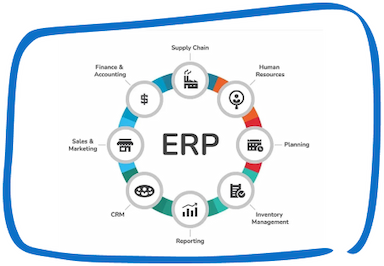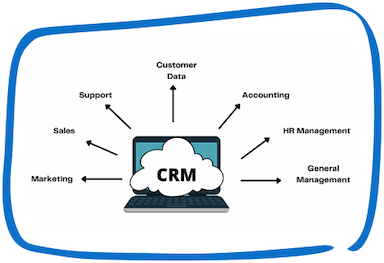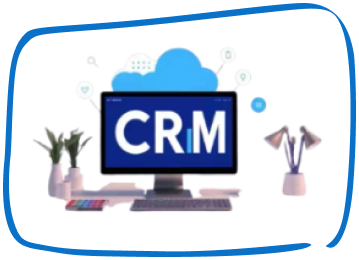The construction sector is rapidly expanding and contributes 6% to the global GDP, with annual expenditures exceeding $10 trillion. According to Globe Newswire, the global construction industry market is expected to reach USD 17,247.96 billion by 2029. However, this growth brings forth a set of challenges, including adhering to tight budgets and project timelines and managing contractors, sub-contractors, construction materials, human resources, and assets. These operational expenses can accumulate swiftly, posing difficulties in monitoring even non-apparent aspects. To navigate these intricacies, the implementation of efficient Enterprise Resource Planning or ERP software for construction companies becomes essential.
Adopting an ERP system tailored for the construction industry allows you to streamline your construction processes and centralize information management.
What is a Construction ERP System?
Construction ERP software is a specialized software designed to assist construction companies in overseeing their complete business operations, spanning from pre-construction stages to post-completion activities. These tailored solutions are specifically crafted to tackle the intricacies of the construction process, offering comprehensive insights into projects. By establishing a centralized database to handle operational, business, and project-specific data, ERP solutions streamline the management of finances, HR, inventory, planning, and other construction-related tasks. With an ERP solution, you can analyze data in ways unattainable through separate systems, equipping you with the necessary tools to elevate your business.
Streamline Construction Operations with ERP Software
Optimize project management, budgeting, and resource allocation with our ERP solution designed specifically for construction companies. Increase efficiency and reduce project delays.
The Construction Industry’s Pressing Challenges
With an annual construction value of around $1.4 trillion and a workforce of over seven million, the US construction sector faces an array of intricate challenges that threaten its continuous progress and growth. Compounded by the COVID-19 pandemic impact, these issues encompass a scarcity of skilled labor, disruptions in supply chains and material procurement, inflation, cyber threats, risk management gaps, and weather-related setbacks. While technological advancements offer potential solutions, not all industry players have fully embraced them. Notable challenges include:
Construction Industry’s Planning Woes
Improper planning poses a significant hurdle for construction firms, jeopardizing project quality, customer trust, and revenue streams. The ensuing labor expenses and client attrition due to delayed projects compound the problem, damaging the company’s reputation.
Incorporating various departments, teams, and resources manually complicates seamless project execution, fostering data duplication, delayed communication, and human errors. Such inefficiencies lead to suboptimal labor and material utilization, deviations from architectural designs, maintenance schedule errors, and resource misallocation, impacting cash flow and budgeting.
Furthermore, managing downtime and contractual issues with clients during project duration further challenges successful construction management.
Complex Information Exchange in Construction
The construction industry often juggles multiple clients simultaneously, leading to complex and chaotic information exchange within the company. Manual processes exacerbate these challenges, resulting in confusion, delays, and errors.
However, managing tasks for various clients through inefficient methods like PowerPoint presentations or Excel spreadsheets is impractical, unsafe, and lacks real-time updates. Certainly, these approaches lack cloud backup, making data vulnerable to loss and unauthorized access.
Therefore, implementing an ERP system can mitigate these issues, ensuring efficient and secure real-time information management for improved construction operations.
Inadequate Communication Hindering Construction Progress
In the construction industry, effective project completion relies on collaboration among various professionals such as architects, engineers, laborers, and more. However, poor communication hampers this collaboration, leading to tasks being overlooked and issues detected too late.
The absence of a centralized communication platform causes critical information gaps, hindering seamless planning and execution. An ERP solution can bridge this gap by providing a unified platform for stakeholders to communicate, update progress, and address challenges, ensuring smoother project management, even in remote or virtual settings.
Unrealistic Expectations, Bad Forecasting, Inaccurate Estimates
In the construction industry, accurate project estimation is crucial for successful bids. However, manually considering numerous parameters like labor, materials, and permissions can lead to errors and inaccurate estimates. Unrealistic client expectations, such as accelerated schedules or limited budgets, can hinder productivity and impact project quality. Bad forecasting, focusing on long-term goals without short-term breakdowns, contributes to these challenges. To address them, an ERP system provides efficient data analysis, enables realistic goal-setting, and aids in effective communication with clients and stakeholders, ensuring accurate estimation and successful project outcomes.
Inefficiency in Decision Making
The complexity of construction projects requires seamless coordination among various teams, disciplines, and locations to achieve common goals. However, delayed or inaccurate information can hinder effective decision-making. Manual processes lead to human errors and data discrepancies, further impacting the decision-making process. Clear, real-time data integration and analysis are essential for efficient decision-making in the construction industry, ensuring timely and accurate project progress and resource management. An ERP system streamlines communication and data flow, addressing this challenge and enhancing overall project efficiency.
Delayed Cash Flow and Inefficient Financial Management
In the construction industry, outdated invoicing systems often lead to delayed payments, impacting cash flow and causing project delays. These financial challenges can result in dissatisfied clients, damaged reputation, and revenue loss. Additionally, fulfilling statutory obligations such as taxation, employee payments, licensing fees, and financial reporting can be cumbersome and error-prone when managed manually. Implementing an ERP system streamlines financial management, ensures timely payments, and enhances compliance, addressing these issues and improving overall financial efficiency.
Importance of ERP software for Construction companies
Efficiently orchestrating tools, resources, and equipment for successful project execution demands significant effort in the construction sector. Thus, embracing an ERP system in construction ensures a robust business solution replete with analytical tools and features that enable streamlined scheduling and data integration.
An ERP system seamlessly melds the fundamental construction functions with various company modules, encompassing financial management, inventory and stock management, human resource management, contractor and vendor management, bid management, CRM, payroll, and other critical business processes.
Key features of an ERP system relevant to the construction industry encompass:
- Centralized database utilization
- Project scheduling optimization
- Expense management streamlining
- Effective inventory control
- Comprehensive reporting and documentation
- Customer relationship management facilitation
- Resource procurement streamlining
- Productivity and performance monitoring
- Contract and purchase order (PO) management
- Effortless human resource wage computation
Benefits of ERP Software for construction companies
Utilizing Data for Project Planning
An ERP system enables the integration of a construction company’s extensive data sources, facilitating enhanced utilization of data for project planning. This encompasses comprehensive expense allocation, labor needs, essential materials, and tools, as well as projected profits. Leveraging data-driven planning aids in the early detection of risks and bottlenecks during project initiation, leading to reduced lead cycle time.
Precise Cost Estimation and Reduction
Construction-specific ERPs accurately assess raw materials, design elements, labor, and project schedules. These solutions enable precise calculation of profit and loss for each project. Thus, they enhance management and forecast timeframes and budgets for upcoming initiatives.
Efficient Project Management
Leveraging an ERP, construction firms can adeptly handle multiple projects concurrently in real time. ERP applications further enhance project optimization by identifying and deploying appropriate resources at the right juncture and location.
Tailored Workflow and Process Adaptations
A robust ERP software for construction companies empowers you to craft customized workflows and processes from inception. You have the ability to define the sequence in which data or reports traverse through various departments. This not only simplifies communication but also enhances process efficiency and promotes collaboration among stakeholders.
Enhanced Data Security
ERP software incorporates a centralized database that streamlines data interchange. The system provides optimal data security and user authentication to ensure secure access based on permissions to stored data. These systems facilitate secure data flow with features like data backups and server safeguarding.
Enhanced Communication and Collaborative Efforts
Effective communication and information sharing are pivotal in managing internal functions across all construction industry departments. ERPs also contribute to seamless real-time communication and information dissemination, elevating project efficiency and empowering individuals and teams in decision-making.
Simplification through Technology
Technology streamlines processes, with 96% of industry leaders, particularly in construction, acknowledging its potential to enhance productivity. Leveraging advanced Construction ERP software can streamline your construction operations, ensuring precision, punctuality, and quality.
Elate Software: A Premier ERP Solution
Elate Software is a top-tier ERP system, offering a fully compliant, seamlessly integrated, and swiftly implementable software solution. Operating on the cloud, Elate provides a real-time, comprehensive overview of your construction industry business processes. Basically, its implementation guarantees smooth operations and the ability to scale across multiple units, making Elate’s ERP a favored choice. Furthermore, the Elate ERP system empowers you to oversee various business operation locations by maintaining connectivity through a centralized data source shared across all teams and sites.
Build Smarter with ERP for Construction Companies
Manage every aspect of your construction projects, from procurement to payroll, with our tailored ERP solution. Improve project visibility and drive successful outcomes.
Tailored Recruitment and Workflow
With Elate, you can also personalize job applications and design tailored hiring workflows, facilitating the acquisition of the skilled employees you seek. In short, if you’re considering implementing ERP construction software and require assistance in refining your choices, feel free to reach out to us.
Speak with Our Team!
4.9 Stars
1k+ reviews on







